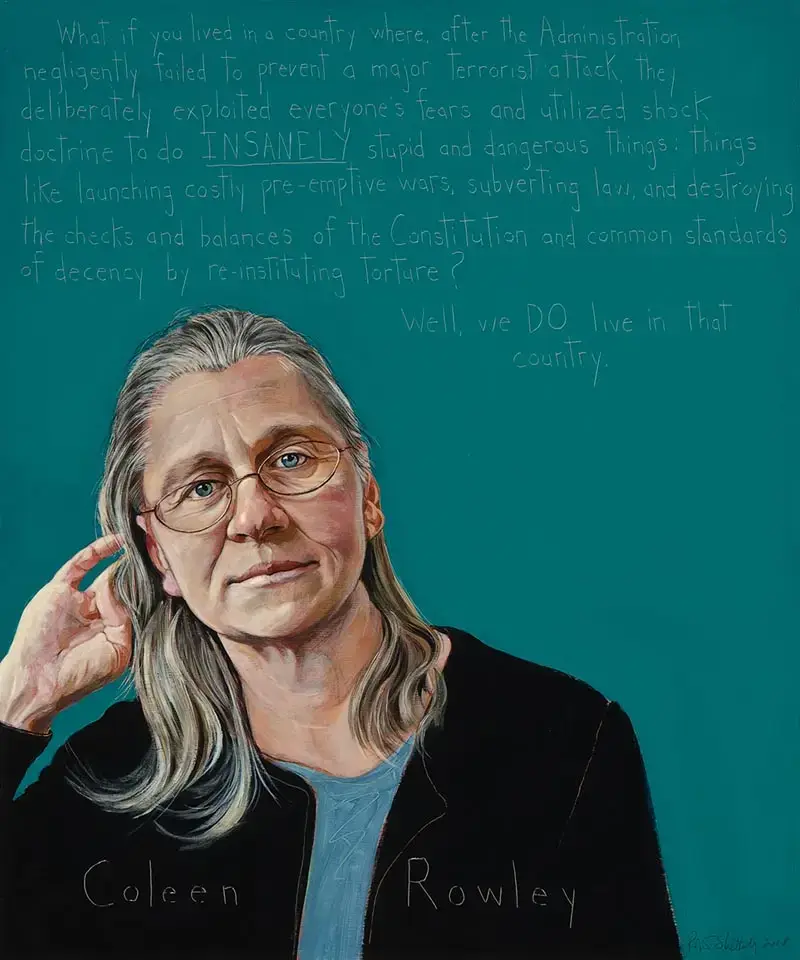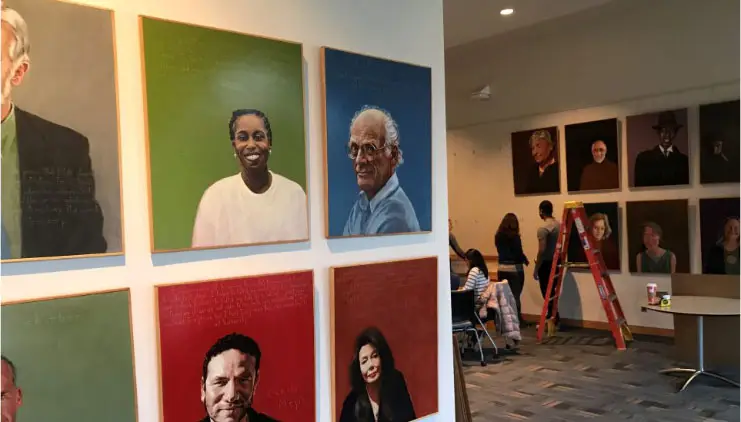
Coleen Rowley
FBI agent, Whistleblower : b. 1954
“What if you lived in a country where, after the Administration negligently failed to prevent a major terrorist attack, they deliberately exploited everyone’s fears and utilized shock doctrine to do INSANELY stupid and dangerous things: things like launching costly pre-emptive wars, subverting law, and destroying the checks and balances of the Constitution and common standards of decency by re-instituting torture? Well, We DO live in that country.”
Biography
It takes courage to risk one’s career and reputation by becoming a whistleblower, defined as “a person who informs on someone engaged in an illicit activity.” For retired FBI agent Coleen Rowley, remaining quiet after the terrorist attacks on September 11, 2001was not an option. Time Magazine named her Person of the Year in 2002, along with fellow whistleblowers Cynthia Cooper of WorldCom and Sherron Watkins of Enron.
Rowley grew up and was educated in Iowa, with a degree in French from Wartburg College and a Juris Doctor from the University of Iowa. In 1981, Rowley became a Special Agent for the FBI and worked in several offices, including those in Nebraska, Mississippi, New York, France and Montreal.
In 1990 she went to Minneapolis as Chief Division Council, and it was there that her office received word about suspected terrorist Zacarias Moussaoui. In a 2010 radio interview, Rowley described how in mid-August of 2001, her office was contacted by some flight instructors, concerned because Moussaoui had paid for flight lessons with large amounts of cash. Already deemed a potential terrorist threat, Moussauoi remained in custody due to a lapsed visa as Rowley´s team, collaborating with the French Intelligence Service, confirmed within days his connections to radical fundamentalist Islamic groups and to Osama bin Laden. Even with this knowledge, the FBI denied Rowley a warrant to search Moussaoui’s computer for information until the day of the attacks.
Rowley believed that a lack of cooperation between intelligence agencies tied her team’s hands when they tried to obtain a probable cause warrant for Moussaoui´s computer less than a month before the 9/11 attacks.
In 2002, Rowley wrote a memo to FBI Director Robert Mueller, detailing the mishandling of the intelligence her office had gathered, and later that year testified before the Senate.
In the memo to Mueller, she describes the inaction of the FBI: “To say, then, as has been iterated numerous times, that probable cause did not exist until after the disastrous event occurred, is really to acknowledge that the missing piece of probable cause was only the FBI’s failure to appreciate that such an event could occur. The probable cause did not otherwise improve or change….The problem with chalking this all up to a ´20-20 hindsight is perfect´ problem…is that this is not a case of everyone in the FBI failing to appreciate the potential consequences. It is obvious, from my firsthand knowledge of the events and the detailed documentation that exists, that the agents in Minneapolis who were closest to the action and in the best position to gauge the situation locally, did fully appreciate the terrorist risk/danger posed by Moussaoui and his possible co-conspirators even prior to September 11th.”
A year after testifying, Rowley went back to being a Special Agent, and retired in 2004. She made an unsuccessful bid for Congress in 2006, and is now a public speaker, writer, and blogger on The Huffington Post, stressing the need to strike a balance between giving intelligence agencies the ability to conduct rigorous investigations of dangerous individuals, and protecting the civil liberties of the public.
Programs
Americans Who Tell the Truth (AWTT) offers a variety of ways to engage with its portraits and portrait subjects. Host an exhibit, use our free lesson plans and educational programs, or engage with a member of the AWTT team or portrait subjects.

Education
AWTT has educational materials and lesson plans that ask students to grapple with truth, justice, and freedom.

Exhibits & Community Engagement
AWTT encourages community engagement programs and exhibits accompanied by public events that stimulate dialogue around citizenship, education, and activism.